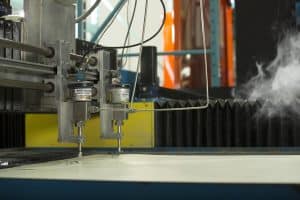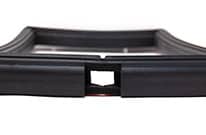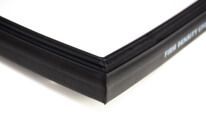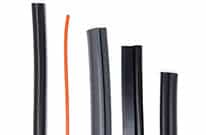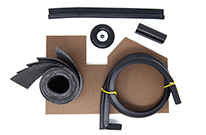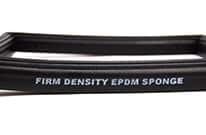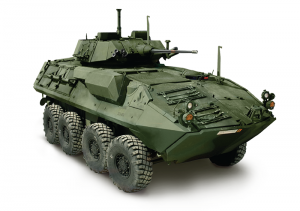 Thermal-acoustic insulation for military land systems absorbs heat and sound. These composite structures are used in engine compartments, doors, floors, side panels, and hatch covers. Elasto Proxy custom-fabricates thermal-acoustic insulation from foams, films, facings, and other specialized materials that meet your requirements. Our capabilities include water jet cutting for precise cuts, lamination for the reliable joining of different materials, and taping for thermal-acoustic insulation that’s easy-to-install.
Thermal-acoustic insulation for military land systems absorbs heat and sound. These composite structures are used in engine compartments, doors, floors, side panels, and hatch covers. Elasto Proxy custom-fabricates thermal-acoustic insulation from foams, films, facings, and other specialized materials that meet your requirements. Our capabilities include water jet cutting for precise cuts, lamination for the reliable joining of different materials, and taping for thermal-acoustic insulation that’s easy-to-install.
For designers of military vehicles, it’s important to specify thermal-acoustic insulation that supports the mission. The big diesel engines that power military land systems run hot and loud. Heat and noise from the engine bay don’t just make the crew compartment uncomfortable. The air conditioning needs to run constantly, soldiers can’t hear each other over engine sounds, and the vehicle’s thermal profile is more susceptible to infrared detection. High heat can damage vehicle electronics, too.
Thermal-Acoustic Insulation: Reducing Heat and Sound
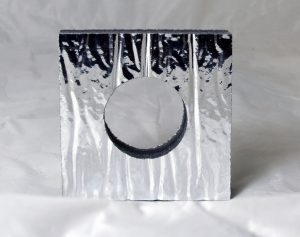 Thermal-acoustic insulation for military land systems includes thermal management materials such as melamine foams, polyimide foams, and fiberglass fabric composites with aluminum foil facings. In addition to reflecting significant amounts of radiant heat, aluminum foil can provide a moisture barrier. Elasto Proxy can help you with material selection and offers expert design assistance. Water jet cutting converts all of these materials cost-effectively and produces clean, straight lines or chamfered angles.
Thermal-acoustic insulation for military land systems includes thermal management materials such as melamine foams, polyimide foams, and fiberglass fabric composites with aluminum foil facings. In addition to reflecting significant amounts of radiant heat, aluminum foil can provide a moisture barrier. Elasto Proxy can help you with material selection and offers expert design assistance. Water jet cutting converts all of these materials cost-effectively and produces clean, straight lines or chamfered angles.
Thermal-acoustic insulation for military vehicles also contains one or more layers of sound-absorbing materials, typically open-cell acoustical foams. These compounds can resist engine oil, the spread of flame or fire, and soapy water from engine wash downs. Acoustical foams are supplied as sheets and support fast, precise water jet cutting. Like thermal insulation, these specialized materials support strong, reliable lamination in a sandwich-like structure.
Meeting More Requirements
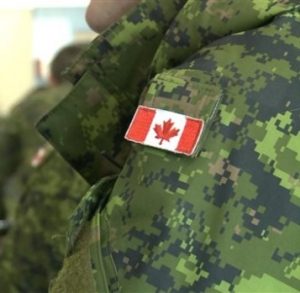 For defense contractors, choosing thermal-acoustic insulation can also mean meeting specific military requirements. For example, the U.S. Department of Defense maintains a standard, MIL-STD-1474E, that specifies the maximum permissible noise levels produced by military land systems. In addition to supporting speech communications in noisy environments, MIL-STD-1474E seeks to minimize the risk of permanent noise-induced hearing loss.
For defense contractors, choosing thermal-acoustic insulation can also mean meeting specific military requirements. For example, the U.S. Department of Defense maintains a standard, MIL-STD-1474E, that specifies the maximum permissible noise levels produced by military land systems. In addition to supporting speech communications in noisy environments, MIL-STD-1474E seeks to minimize the risk of permanent noise-induced hearing loss.
Protection against heat and noise is important, but manufacturers of military vehicles also need to protect on-board instruments from sound-induced vibrations. Otherwise, these noise disturbances can shorten equipment life through component failure. Along with vibration dampening, defense contractors want thermal-acoustic insulation that’s easy to install. That’s why Elasto Proxy custom-fabricates insulation that attaches to surfaces like engine firewalls and hatch covers with pressure-sensitive adhesive (PSA) tape.
From Prototyping to Production
For over 25 years, Elasto Proxy has been a trusted member of the defense supply chain. In addition to design assistance and help with material selection, we provide quick-turn prototypes so that defense contractors can test their product designs. With water jet cutting, there’s no tooling or waiting for tooling. So if you need to re-design a part, you won’t have to discard an expensive die or mold and then wait for new tooling to arrive.
In addition to prototyping, water jet cutting is ideal for low-to-medium volume manufacturing. Elasto Proxy also adds value to military land systems by offering testing services. For example, if you need custom insulation that reduces specific decibel levels, we can ensure that your thermal-acoustic insulation meets this requirement. We can also suggest and then custom-fabricate acoustical materials that block sounds at specific frequencies.

